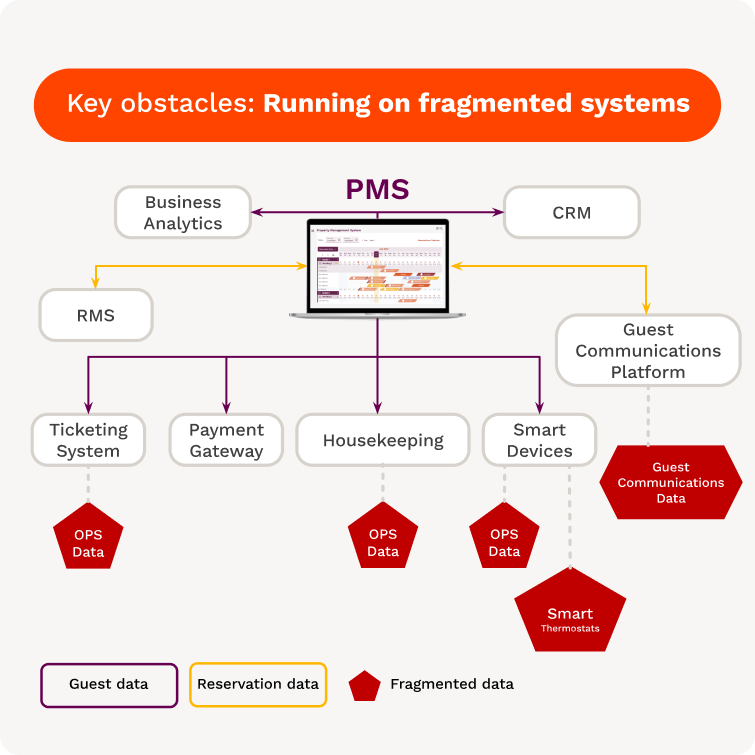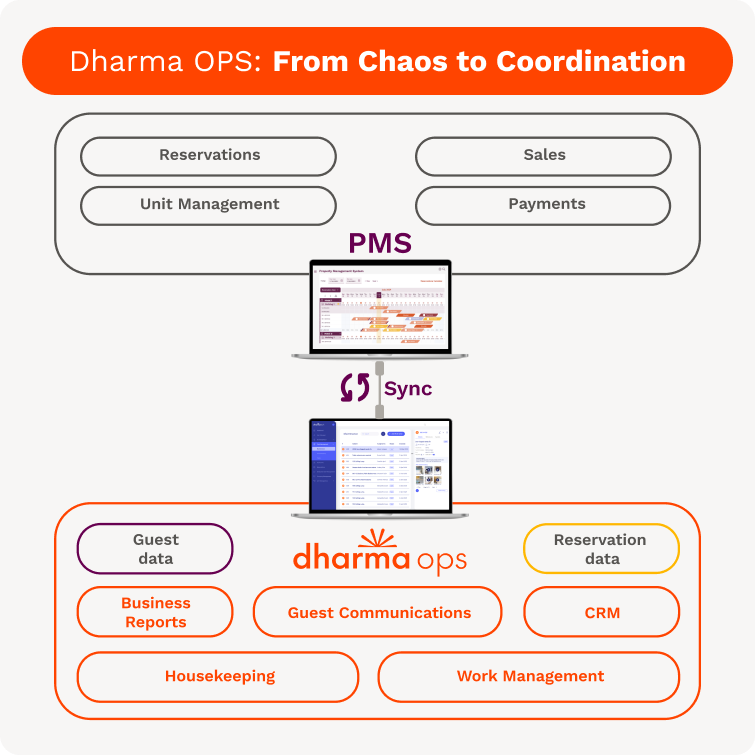With the ever-increasing demand, hotel operators are under intense pressure to boost efficiency, cut costs, and elevate guest satisfaction. Manual workflows across departments often create friction: human error results in service lapses, communication gaps lead to delays, and disconnected tools make coordination cumbersome. That’s why hotel automation and integrated workflow are rapidly moving to becoming essential tools for operational success.
By implementing an integrated smart hotel software solution, hotels can unify operations on one dashboard - reducing complexity and freeing staff to focus on guest experiences. This blog explores how the adoption of AI-driven hotel operations is reshaping hospitality, what real hotel automation use cases look like, how to implement automation, and the clear automation benefits that await forward-thinking hoteliers.
What Is Workflow Automation in Hotels?
Workflow automation in hotels refers to the use of software, APIs, AI tools, and digital systems to automate repetitive, rule-based tasks across front office, housekeeping, maintenance, revenue, and guest services. Instead of staff manually initiating one task after another, an automated system triggers subsequent actions seamlessly on its own.
For example, when a guest checks out, the PMS might instantly generate a housekeeping ticket, update room availability, route invoices, and send a checkout survey - without manual intervention.
This level of end-to-end process orchestration is the backbone of hotel automation. It ensures tasks are executed more reliably, faster, and with fewer errors - especially when paired with AI to make decision-based leaps (for example, prioritizing rooms for deep cleaning or VIP arrivals).
To understand why hotels are racing toward automation, let’s look at the data:
These numbers show two things: 1) the hospitality industry is aggressively embracing automation benefits, and 2) many operators lag behind, presenting huge potential upside for early adopters.
Below are key modules and real-world hotel automation use cases where workflow automation in hotels unlocks value. These reflect both commonly automated areas and emergent innovation.
• Contactless check-in / mobile check-in & key delivery: Guests can complete check-in via app, bypass front desk, and receive a digital key - reducing queue times and friction.
• Guest communication and upsell sequences: Automate pre-arrival messaging, upsell offers, in-stay engagement, and post-stay review prompts.
• Chatbots / virtual assistants: AI handles guest queries (amenities, local info, service requests) 24/7, escalating complex issues to staff.
• Auto-generation of housekeeping tasks: Upon checkout, the system routes the room to housekeeping with requisite notes (deep clean, VIP, etc.).
• Task optimization & route planning: Smart systems balance workload, avoid floor crossovers, and prioritize tasks for speed.
• Preventive maintenance alerts: IoT sensors detect malfunctions (like HVAC faults) and trigger maintenance orders automatically.
• Dynamic pricing / revenue management: AI models scan demand, competitor rates, and occupancy to adjust room rates automatically.
• Invoice processing & approvals: Vendor invoices, utility bills, expense reimbursements flow through automated routing and approval chains.
• Performance dashboards & alerts: Real-time revenue and cost metrics trigger notifications for anomalies (e.g. ADR drop, budget overruns).
• Inventory and supply chain management: Track consumable usage, auto-reorder supplies, alert on low stock.
• Staff scheduling & task assignment: Shift planning, cross-department tasks, and workload balancing are handled automatically.
• Interdepartmental handoffs: A guest request escalated from front desk to maintenance triggers automated notifications, tracking & escalation paths.
By knitting these capabilities together, hotels can shift from reactive, siloed operations into a unified, proactive platform of smart hotel software.
At Dharma, we believe the next generation of hotel operations must be unified, intelligent, and flexible. Here’s how Dharma OPS aligns with the vision of hotel automation, smart hotel software, and AI-driven hotel operations:
Dharma centralizes housekeeping, maintenance, inspections, and issue management in one dashboard, bridging departmental silos. Automated task generation, reminders, and linked work orders ensure nothing falls through the cracks.
Our AI chatbot handles guest queries, upsells, and service requests across multiple messaging platforms. It routes more complex requests to staff and generates work orders automatically - part of a seamless workflow automation in hotels design.
From suggesting optimized task sequences to flagging bottlenecks, Dharma’s staff-facing AI assistant boosts productivity, shortens onboarding, and reduces errors - all signature automation benefits.
Dharma’s reporting tools uncover inefficiencies, content bottlenecks, and trends across operations - fueling smarter decisions, tighter workflows, and data-driven continuous improvement.
Dharma is built for flexibility and ease of integration, making it easier for hotels to implement automation without being locked into monolithic, inflexible systems.
In short, Dharma embodies the type of smart hotel software that links front desk, housekeeping, maintenance, guest operations, and analytics into a single, AI-infused ecosystem.
Implementing automation technologies yields benefits across multiple dimensions. Below are the key gains, and how they translate into impact:
Manual entry, duplicate work, and miscommunications are significant sources of error. Automation enforces rules, eliminates redundant tasks, and yields consistent outcomes.
Automation accelerates not only individual tasks but entire chains. What once required manual coordination across departments now happens instantly.
By offloading repetitive tasks, staff can focus on high-value, guest-centric work. That boosts morale and team effectiveness.
Automation can reduce staffing needs or reallocate human resources more efficiently.
Guests expect friction-free, digital-first experiences. Automation supports this seamlessly.
With automation, hotels can scale operations with fewer incremental costs. Analytics become richer, enabling smarter decisions.
Together, these benefits make the economic and strategic case for hotels to adopt workflow automation in hotels and smart hotel software as core infrastructure, not optional enhancements.

Transitioning to automated workflows isn’t trivial. Here are the key obstacles and how to address them:
Hotels often run fragmented systems (PMS, POS, CRM, housekeeping). Ensuring smooth data flow requires robust APIs, middleware, or custom connectors.
Best practice: Choose automation platforms built to integrate with leading PMS/CRS/IoT vendors, or include integration support in vendor selection.
Resistance often arises because staff fear automation will replace jobs. Or they distrust new workflows.
Best practice: Train early, involve staff in design, emphasize that automation augments rather than replaces, and pilot in non-critical areas first.
Automation amplifies bad data. If guest profiles, room status, or inventory records are inconsistent, errors cascade.
Best practice: Clean data upfront, implement validation rules, and build feedback loops to correct anomalies.
Not every scenario can be handled via simple rules. Some decisions need human judgment.
Best practice: Design workflows that allow human override and escalation for edge cases, while automating 80–90% of typical cases.
The upfront cost - software licenses, implementation, training - can be significant.
Best practice: Use pilot projects with measurable metrics (time saved, error rates reduced, guest satisfaction uplift) to build a business case.
Workflows evolve, guest behavior changes, and external factors shift.
Best practice: Plan for continuous improvement, version control, and monitoring dashboards to track performance.

When hotel operators embrace automation across workflows, the impact compounds:
This is not a distant future - it’s happening now. In 2025, AI-driven hotel operations are emerging as the new standard, not the exception. Hotels that delay automation risk becoming operationally brittle, unable to meet guest expectations or compete with tech-first rivals.
By investing in workflow automation in hotels, deploying smart hotel software, and leveraging hotel automation use cases that drive real ROI, operators can transform their businesses for the future.
Hotel automation is the future of operational efficiency. From eliminating human error and speeding task execution to enabling cohesive cross-department communication, automation does more than streamline - it transforms how hotels operate.
If you’d like to see how Dharma can help unify operations, enhance guest experiences, and realize the full automation benefits for your property, we’d love to chat.
Book a Free Consultation with Dharma today and begin your journey toward smarter, faster, and more reliable hotel operations.